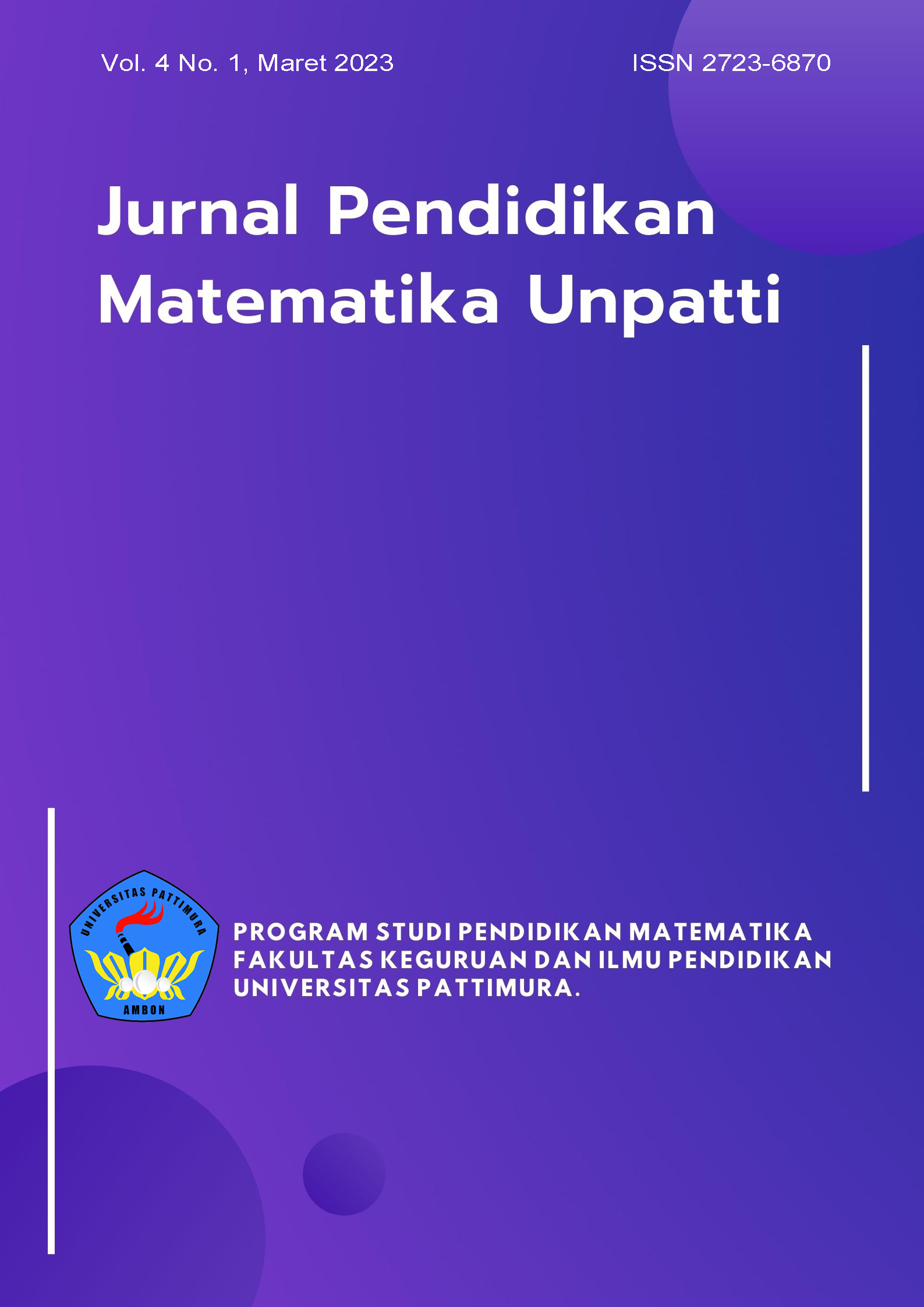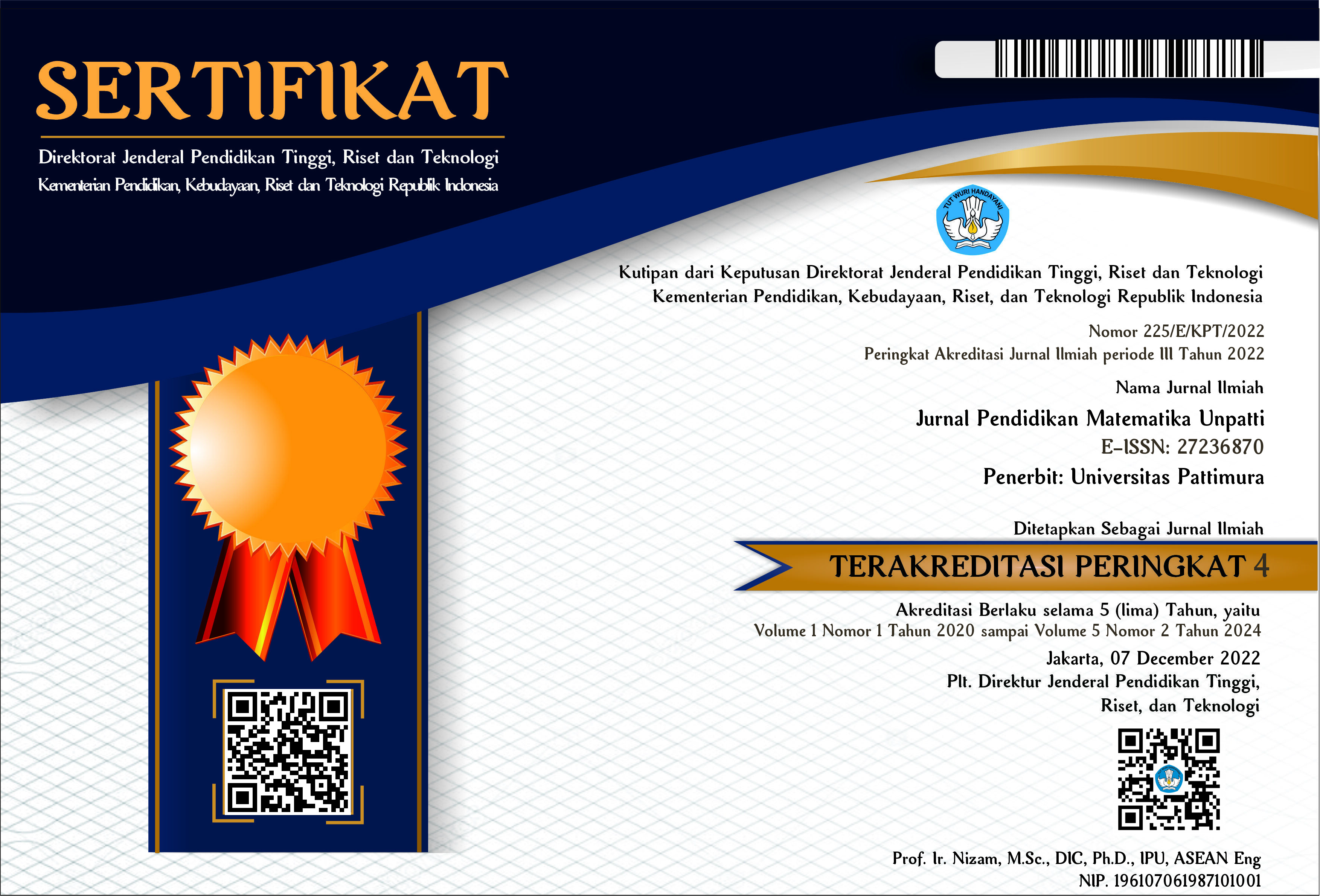EKSPERIMENTASI MODEL CASE METHOD BERBANTUAN E-MODULE TERHADAP HASIL BELAJAR ANALISIS KOMPLEKS DITINJAU DARI PERSEPSI MAHASISWA TERHADAP MATA KULIAH
Abstract
This study aims to find out the influence of the case method learning model assisted by e-module on the learning outcomes of mathematics education students in Nusa Cendana University based on students' perceptions of complex analysis courses. This research is quantitative research with quasi experimental type of research. Population of the study is all the active students, while the sample consist of 106 students consisting of 51 students in the control class who were taught by direct learning model without e-module and 55 students in the experimental class who were taught by case method model with e-module. This research used questionnaire, test, and documentation for collecting the research data. It used two-way ANOVA with different cell for analyzing the data. The result indicates that (1) there is significant difference in the learning outcomes of students who are taught using the case method model assisted by e-module and students who are taught by direct learning models without e-module, (2) there is significant difference in student learning outcomes based on the categories of student perceptions of complex analysis courses, (3) there is no significant difference in student learning outcomes for each group of interaction of learning treatment and student perceptions
Downloads
References
Ahmad, N. A., Azizan, F. L., Rahim, N. F., Jaya, N. H., Shaipullah, N. M., & Siaw, E. S. (2017). Relationship between Students’ Perception toward the Teaching and Learning Methods of Mathematics’ Lecturer and Their Achievement in Pre-University Studies. International Education Studies, 10(11), 129–134. https://doi.org/10.5539/ies.v10n11p129
Anidlah, I. S., Molle, J. S., & Ayal, C. S. (2021). Perbedaan Hasil Belajar Siswa Yang Diajarkan Dengan Model Pembelajaran Problem Based Learning Dan Model Pembelajaran Konvensional Pada Materi Operasi Hitung Bentuk Aljabar. Jurnal Pendidikan Matematika Unpatti, 2(1), 1–5. https://doi.org/10.30598/jpmunpatti.v1.i2.p1-5
Aziz, S. N., & Suparman. (2020). Design Of Mathematical E-Module Based On Inquiry Learning Model To Stimulate The Creative Skills. International Journal of Scientific & Technology Research, 9(3), 4806–4812. www.ijstr.org
Budiyono. (2013). Statistika Untuk Penelitian. UNS Press.
Damanik, T. M., Hutasuhut, S., & Fitrawaty, F. (2020). The Development of E-Module to Improve Learning Results Introduction to Accounting I. Budapest International Research and Critics in Linguistics and Education (BirLE) Journal, 3(4), 2194–2207. https://doi.org/10.33258/birle.v3i4.1496
Dewi, W. I. S., Sasomo, B., & Rahmawati, A. D. (2022). Eksperimentasi Model STAD Flipped Classroom Media Edmodo Terhadap Prestasi Belajar Ditinjau dari Motivasi Belajar. UNION: Jurnal Ilmiah Pendidikan Matematika, 10(1), 67–80. https://doi.org/10.30738/union.v10i1.12161
Exacta, A. P., Hadiprasetyo, K., Afghohani, A., & Astutiningtyas, E. L. (2021). Analisis Kemampuan Problem Solving Mahasiswa Pada Mata Kuliah Analisis Kompleks Ditinjau dari Kemampuan Awal. JEID: Journal of Educational Integration and Development, 1(2), 80–87.
Fonna, M., & Mursalin. (2018). Pengembangan Modul Geometri Analitik Bidang Berbantuan Wingeom Software untuk Meningkatkan Kemampuan Representasi Matematis. UNION: Jurnal Pendidikan Matematika, 6(3), 391–402.
Hataul, L. S., Mataheru, W., & Moma, L. (2020). Perbedaan Hasil Belajar Siswa Dengan Model Pembelajaran Kooperatif Tipe Quick On The Draw Dan Konvensional Pada Materi Persamaan Eksponen. Jurnal Pendidikan Matematika Unpatti, 1(2), 56–63. https://doi.org/10.30598/jpmunpatti.v1.i2.p56-63
Helma, H., & Murni, D. (2020). Factors affecting students’ capabilities in analyzing by using flow proof in real analysis lectures. Journal of Physics: Conference Series, 1554(1). https://doi.org/10.1088/1742-6596/1554/1/012040
Hendrastuti, Z. R., Franita, Y., Fitriani, E., & Rahayu, D. D. (2020). Pengembangan Modul Mata Kuliah Aljabar Linear Berbasis Model Pembelajaran Knisley. UNION: Jurnal Pendidikan Matematika, 8(3), 431–441.
Hodijah, S., Hastuti, D., & Zevaya, F. (2022). Implementasi model case method dalam meningkatkan inovasi pembelajaran mahasiswa dan kemampuan berpikir kritis pada mata kuliah teknik perdagangan Internasional. In Jurnal Paradigma Ekonomika (Vol. 17, Issue 2).
Huda, N., Wahyuni, T. S., & Fauziyah, F. D. (2021). Students’ Perceptions of Online Mathematics Learning and Its Relationship Towards Their Achievement. Advances in Social Science, Education and Humanities Research, 529.
Karagiannopoulo, E., & Entwistle, N. (2019). Students’ Learning Characteristics, Perceptions of Small-Group University Teaching, and Understanding Through a “Meeting of Minds.” Frontiers in Psychology, 10(444).
Kholisyoh, S. A., Kusmanto, B., & Arigiyati, T. A. (2016). Hubungan antara Minat Belajar, Perhatian Orang Tua, dan Persepsi terhadap Matematika dengan Prestasi Belajar. UNION: Jurnal Ilmiah Pendidikan Matematika, 8(2), 155–164. https://doi.org/10.30738/.v4i3.432
Kiarsi, S., & Ebrahimi, S. F. (2021). Students’ Lived Experience Of Factors Affecting Difficulties In Learning Mathematics: A Phenomenological Study. Elementary Education Online, 20(6), 1047–1058. https://doi.org/10.17051/ilkonline.2021.06.111
Kinney, W. (2017). Using Modules in Teaching Complex Analysis. PRIMUS: Problems, Resources, and Issues in Mathematics Undergraduate Studies, 27(8–9).
Krestiwi, K. (2017). Pengaruh Model Pembelejaran Berbasis Masalah Dalam Menumbuhkan Metakognisi dan Meningkatkan Kemampuan Berpikir Kreatif Matematis Siswa di Kelas VIII MTsN Jakarta. UNION: Jurnal Pendidikan Matematik, 5(3), 245–252.
Kumah, M. S., & Wonu, N. (2022). Factors affecting the mathematics learning outcome of underachieving students at Colleges of Education. Faculty of Natural and Applied Sciences Journal of Mathematics and Science Education, 3(2), 1–10. www.fnasjournals.com
Lestari, R. S., Purnami, A. S., & Arigiyati, T. A. (2021). Hubungan antara Motivasi Kemandirian Belajar dan Persepsi Siswa terhadap Matematika dengan Prestasi Belajar Siswa SMK. UNION: Jurnal Ilmiah Pendidikan Matematika, 9(1), 91–100. https://doi.org/10.30738/union.v9i1.7965
Maulana, M. N., Muslim, S., & Sukardjo, M. (2022). The Effectiveness of Using Electronic Modules in Mathematics Subjects in the Material of Constructing Flat Sided Space. Journal of Education Research and Evaluation, 6(1), 80–87. https://doi.org/10.23887/jere.v6i1.38785
Mutodi, P., & Ngirande, H. (2014). The influence of students’ perceptions on mathematics performance. A case of a selected high school in South Africa. Mediterranean Journal of Social Sciences, 5(3), 431–445. https://doi.org/10.5901/mjss.2014.v5n3p431
Pratiwi, M. (2014). Efektivitas Modul Analisis Kompleks Dengan Pendekatan Keterampilan Proses Pada Program Studi Pendidikan Matematika Di Stkip Pgri Sumatera Barat. Lemma, 1(1), 33–42.
Ramadani, M., & Yuni, H. (2022). Improving Learning Achievements Through Case-Based Method. Advances in Social Science, Education and Humanities Research, 650.
Rochsun, & Agustin, R. D. (2020). The Development of E-Module Mathematics Based on Contextual Problems. European Journal of Education Studies, 7(10), 400–412. https://doi.org/10.46827/ejes.v7i10.3317
Ruslan, & Rauddin. (2022). Development of E-Module for Introduction to Educational Technology at Muhammadiyah University of Makassar. IJ-ET: INDONESIAN JOURNAL OF EDUCATIONAL TECHNOLOCY, 1(1), 53–66.
Sagala, P. N., Suhendro L, P., & Widyastuti, E. (2022). Development Of First High School Mathematics LKPD Based On Case Method Integrated Local Culture Mandailing Tribe. International Journal of Educational Research and Social Sciences (IJERSC), 3(4), 1734–1743. https://ijersc.org/
Sarbunan, C. N., Molle, J. S., & Gaspersz, M. (2020). Perbedaan Hasil Belajar Siswa Yang Diajarkan Dengan Menggunakan Model Pembelajaran Quantum Teaching Dan Model Pembelajaran Konvensional. Jurnal Pendidikan Matematika Unpatti, 1(1), 10–15.
Solihudin JH, T. (2018). Pengembangan E-Modul Berbasis Web Untuk Meningkatkan Pencapaian Kompetensi Pengetahuan Fisika Pada Materi Listrik Statis Dan Dinamis SMA. Jurnal Wahana Pendidikan Fisika, 3(2), 51–61. https://doi.org/10.17509/wapfi.v3i2.13731
Sugiyono. (2018). Metode Penelitian Kuantitatif Kualitatif. Bandung: Alfabeta.
Sumargiyani, & Munawarrahman. (2019). Pengaruh Model Pembelajaran NHT dan TPS Terhadap Hasil Belajar Kalkulus Ditinjau dari Motivasi Belajar. UNION: Jurnal Pendidikan Matematika, 7(2), 177–185.
Udil, P. A. (2020). Persepsi Mahasiswa Tentang Perkuliahan Berbasis E-Learning dengan Menggunakan Schoology. Fraktal: Jurnal Matematika Dan Pendidikan Matematika, 1(1), 79–91. https://doi.org/10.35508/fractal.v1i1.3147
Udil, P. A. (2022). Pengembangan Bahan Ajar Analisis Kompleks Berbasis E-Learning. Haumeni Journal of Education, 2(1), 154–166.
Udil, P. A., & Israfil. (2022). The effect of mathematics anxiety towards students’ metacognition ability in 12thgraders. AIP Conference Proceedings, 2577(July). https://doi.org/10.1063/5.0096012
Udil, P. A., Kusmayadi, T. A., & Riyadi. (2017). Profile of mathematics anxiety of 7th graders. AIP Conference Proceedings, 1868. https://doi.org/10.1063/1.4995144
Utami, L. W., & Indriyanti, D. R. (2014). Penerapan Metode Case Study Untuk Mengoptimalkan Hasil Belajar Siswa Materi Hama dan Penyakit Tumbuhan. Lembaga Ilmu Kependidikan (LIK), 43(2), 79–84. http://journal.unnes.ac.id/nju/index.php/LIK
Xiang, J., Wan, Y., & Zhou, J. (2019). Factors affecting the learning effect of advanced mathematics among chinese college students in social science majors. Eurasia Journal of Mathematics, Science and Technology Education, 15(11), 1–14. https://doi.org/10.29333/ejmste/109607
Copyright (c) 2023 Patrisius Afrisno Udil

This work is licensed under a Creative Commons Attribution 4.0 International License.
Jurnal Pendidikan Matematika Unpatti is an Open Access Journal. The authors who publish the manuscript in Jurnal Pendidikan Matematika Unpatti agree to the following terms:
Jurnal Pendidikan Matematika Unpatti is licensed under a Creative Commons Attribution 4.0 International . This permits anyone to copy, redistribute, remix, transmit and adapt the work provided the original work and source is appropriately cited.
This means:
(1) Under the CC-BY license, authors retain ownership of the copyright for their article, but authors grant others permission to use the content of publications in Jurnal Pendidikan Matematika Unpatti in whole or in part provided that the original work is properly cited. Users (redistributors) of Jurnal Pendidikan Matematika Unpatti are required to cite the original source, including the author's names, Jurnal Pendidikan Matematika Unpatti as the initial source of publication, year of publication, volume number, issue, and Digital Object Identifier (DOI); (2) Authors grant Jurnal Pendidikan Matematika Unpatti the right of first publication. Although authors remain the copyright owner.





